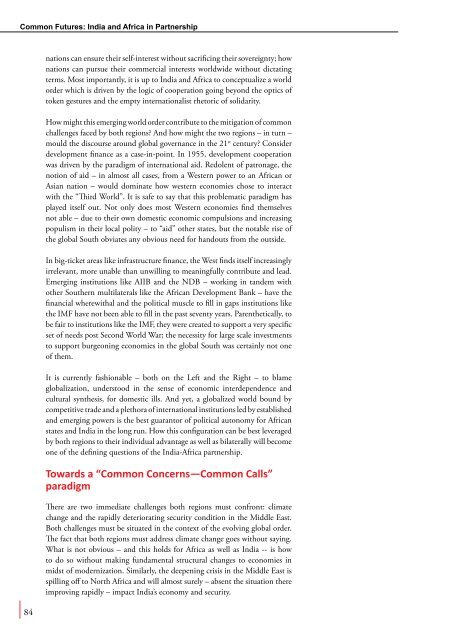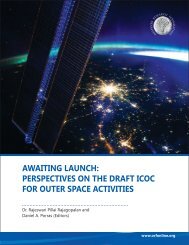Common Futures
II3UUw
II3UUw
Create successful ePaper yourself
Turn your PDF publications into a flip-book with our unique Google optimized e-Paper software.
<strong>Common</strong> <strong>Futures</strong>: India and Africa in Partnership<br />
84<br />
nations can ensure their self-interest without sacrificing their sovereignty; how<br />
nations can pursue their commercial interests worldwide without dictating<br />
terms. Most importantly, it is up to India and Africa to conceptualize a world<br />
order which is driven by the logic of cooperation going beyond the optics of<br />
token gestures and the empty internationalist rhetoric of solidarity.<br />
How might this emerging world order contribute to the mitigation of common<br />
challenges faced by both regions? And how might the two regions – in turn –<br />
mould the discourse around global governance in the 21 st century? Consider<br />
development finance as a case-in-point. In 1955, development cooperation<br />
was driven by the paradigm of international aid. Redolent of patronage, the<br />
notion of aid – in almost all cases, from a Western power to an African or<br />
Asian nation – would dominate how western economies chose to interact<br />
with the “Third World”. It is safe to say that this problematic paradigm has<br />
played itself out. Not only does most Western economies find themselves<br />
not able – due to their own domestic economic compulsions and increasing<br />
populism in their local polity – to “aid” other states, but the notable rise of<br />
the global South obviates any obvious need for handouts from the outside.<br />
In big-ticket areas like infrastructure finance, the West finds itself increasingly<br />
irrelevant, more unable than unwilling to meaningfully contribute and lead.<br />
Emerging institutions like AIIB and the NDB – working in tandem with<br />
other Southern multilaterals like the African Development Bank – have the<br />
financial wherewithal and the political muscle to fill in gaps institutions like<br />
the IMF have not been able to fill in the past seventy years. Parenthetically, to<br />
be fair to institutions like the IMF, they were created to support a very specific<br />
set of needs post Second World War; the necessity for large scale investments<br />
to support burgeoning economies in the global South was certainly not one<br />
of them.<br />
It is currently fashionable – both on the Left and the Right – to blame<br />
globalization, understood in the sense of economic interdependence and<br />
cultural synthesis, for domestic ills. And yet, a globalized world bound by<br />
competitive trade and a plethora of international institutions led by established<br />
and emerging powers is the best guarantor of political autonomy for African<br />
states and India in the long run. How this configuration can be best leveraged<br />
by both regions to their individual advantage as well as bilaterally will become<br />
one of the defining questions of the India-Africa partnership.<br />
Towards a “<strong>Common</strong> Concerns—<strong>Common</strong> Calls”<br />
paradigm<br />
There are two immediate challenges both regions must confront: climate<br />
change and the rapidly deteriorating security condition in the Middle East.<br />
Both challenges must be situated in the context of the evolving global order.<br />
The fact that both regions must address climate change goes without saying.<br />
What is not obvious – and this holds for Africa as well as India -- is how<br />
to do so without making fundamental structural changes to economies in<br />
midst of modernization. Similarly, the deepening crisis in the Middle East is<br />
spilling off to North Africa and will almost surely – absent the situation there<br />
improving rapidly – impact India’s economy and security.








